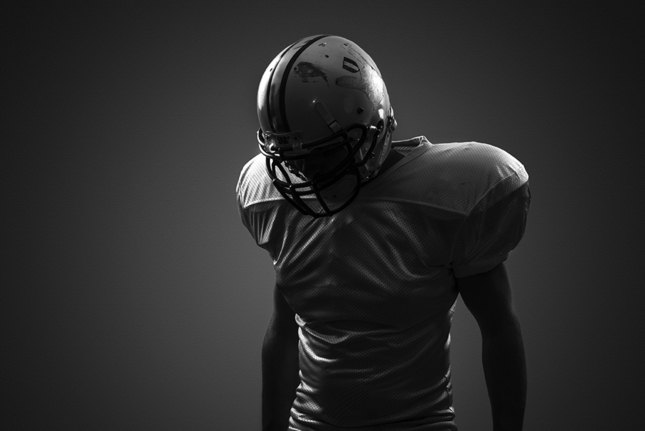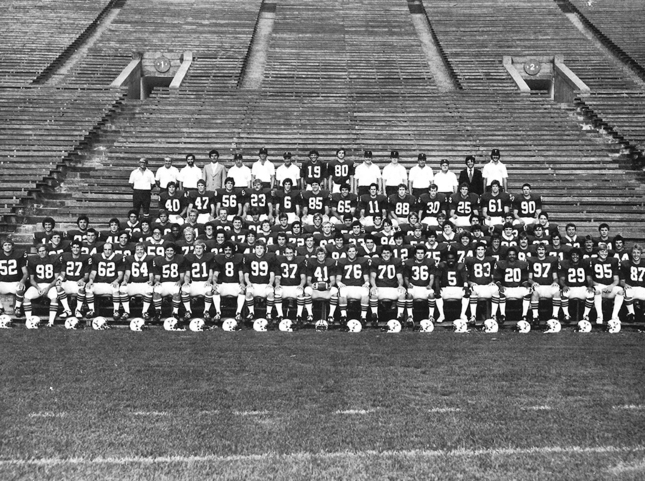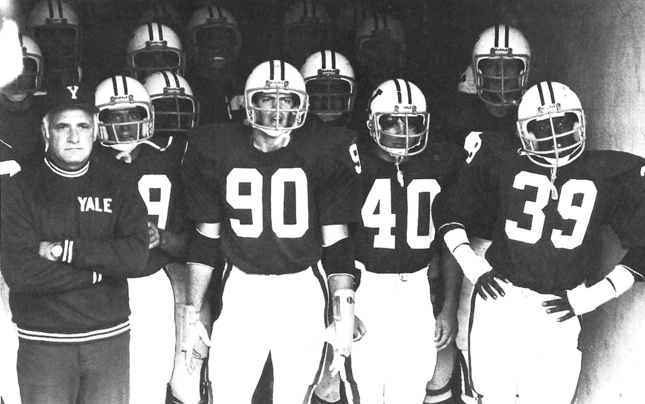
Samuele Cavicchiph / istock

Samuele Cavicchiph / istock

Yale Banner
The Yale football team in 1980. Jeff Manning, number 52, is at far left in the front row.
View full image

Yale Banner
The Yale football team in 1980. Jeff Manning, number 52, is at far left in the front row.
View full image

Yale Banner
Players on the 1979 team, standing with the celebrated coach Carm Cozza. Left to right: captain Tim Tumpane ’80, Kevin Czinger ’81, ’87JD, Otha “Skip” Porter ’80.
View full image

Yale Banner
Players on the 1979 team, standing with the celebrated coach Carm Cozza. Left to right: captain Tim Tumpane ’80, Kevin Czinger ’81, ’87JD, Otha “Skip” Porter ’80.
View full image
Let’s set the scene. It’s 1977 on a brilliant New Haven September day, and I am standing in a Linsly-Chittenden Hall queue with about a thousand other frosh, waiting for keys to my Old Campus room. It’s a chaotic scene, and in a friendly and neighborly way I share with the folks around me, “You would think that at a place like Yale it would be more organized.”
The guy standing in front of me says, “Probably football players working bursar jobs.”
Then he turns around to see how his bon mot is received by the crowd. His nose points to about the third button down on my shirt. He looks up at my
6' 4" frame. His eyes widen.
“Yes,” I reply, “I’m on the team.”
A lot has changed since Walter Camp, Class of 1880, convinced the collegiate committee to adopt “Yale Rules” in 1880, earning Camp the handle of “Father of American Football.” According to a 2021 Forbes estimate, the aggregate value of the NFL exceeds $100 billion, and this season’s viewership has rebounded from last year’s challenges. However, even casual fans know that the long-term impacts of concussions—specifically the risks of CTE, ALS, or Parkinson’s—have filtered down to the roots of the sport. The Ancient Eight of the Ivy League have done a lot to change rules and practice protocols to address these risks, leading the nation once again on and off the gridiron.
And perhaps you saw the recent news that Harvard athletes with the highest or second-highest academic rating on an internal admissions scale have an acceptance rate of 83 percent, compared with 16 percent for non-athletes. Lost in that headline is that the young men and women athletes considering an application to the Ivy League—a conference without athletic scholarships—have been extensively vetted before the coach “slots” a candidate for admission. In 1985, the Council of Ivy Group Presidents created the Academic Index to monitor athletes and non-athletes in each freshman class; a complicated multi-variable screen strives to keep its athletes within a statistically comparable band at every Ivy League college.
It was my remarkable good fortune to be recruited to play football at Yale. It was the modern golden era, when Carm Cozza’s teams won titles five times in six seasons from 1976 to 1981. I have no doubt football was the reason I got into Yale. Don’t get me wrong. I was a legitimate candidate for admission: a solid student with respectable SAT scores and an outstanding leader in my small-town high school—student body president, active in chorus, band, and musicals, and a three-sport letter winner and captain of two. Still, other applicants with higher SAT and GPA scores from more prestigious high schools did not get in.
I got the thick envelope in March 1977. Football made the difference.
Countless times during my Yale experience I heard snide comments about “dumb” football players, although Yale’s sports information office noted that the 1980 team had 66 members of the National Honor Society, 10 valedictorians, 5 salutatorians, 48 high school captains, and 14 student body or high school class presidents. Compare that Ivy championship team’s academic record with any other 100 randomly selected Yale undergraduates.
While classmates poked fun, we usually played along. Turned the other cheek, laughed it off. Once at an Ezra Stiles mixer, the team captain shouted John Merrick’s line: “I am not an animal! I am a human being!” That guy went on to Oxford on a Rhodes Scholarship. A few faculty members stood out as intentionally positive—with perhaps the finest example being the great master Robert Thompson ’55, ’65PhD, of Timothy Dwight. But some faculty members were hostile. No need for counseling or special mentors to deal with this hostility. We dealt with it. Plus, we had our remarkable teammates and legendary coaches.
During my undergraduate years, football players were highly integrated into residential college life. We slept in the dorms, ate in the dining halls, and played intramural sports in the off seasons. (The Intramural Basketball B-League was full contact.) In 1977, four football players sang with the Yale Spizzwinks(?), and at least one other sang with the SOBs. Several teammates were active in musicals and theater. If a teammate lived off campus, it was usually for financial reasons, not because of any antagonism from the student body, faculty, or administration. In recent years more and more of the “helmeted athletes” are moving off campus and care not to be criticized. Today the administration intentionally asks the coaching staff to encourage players to live in the residential colleges. Sometimes it works. But as with the proliferation of Greek life, Yale’s residential college system may not have the influence it once did. An issue with the legal drinking age, perhaps?
Or perhaps things are getting nastier and less civil. Think of the momentous year of 1968. It was the summer of the Democratic National Convention, when thousands of protesters swarmed the streets of Chicago to rally against the war. It was the year of the assassinations of the Rev. Martin Luther King Jr. and Robert F. Kennedy. Riots shook Washington, DC, Baltimore, Detroit, and New Haven, amongst others. Yet despite the turbulent times, Yale students and faculty followed, supported, and cheered their football team, led by giants like Brian Dowling ’69 (Doonesbury’s “BD”) and Calvin Hill ’69, with Yale racking up an undefeated streak of 16 wins over two seasons. Thousands of students regularly attended games in the Bowl. Yale football does not get that fan support today.
In 2018, Alex Galland ’19, a Yale football senior, contributed his thoughts in the Yale Daily News on the Friday before The Game. Here’s an excerpt:
When you visit the campus for your official visit as a senior in high school on a recruiting trip, everyone you meet tells you all sorts of things about Yale University and the Yale football program. But there’s a lot they don’t tell you. . . . They certainly don’t tell you that in spite of the great ethnic and socioeconomic diversity of your team, in spite of the social mobility your team offers to high-achieving student-athletes from under-resourced schools like yours, members of the Yale community will constantly call into question your team’s validity and worthiness. They will sign a petition to get rid of your sport; they will scorn the sight of you walking into the Stiles dining hall. . . . They are students and faculty alike, and they will tell you to your face that you don’t belong here. . . .
But the truth is, you’ll still have the time of your life doing what you love in the face of adversity. The truth is, what they do tell you about Yale football is spot on. They told me I would find a family, the likes of which I had never seen and can’t find anywhere else on this campus, one that I would never be able to adequately describe to other people, one that would pick me up when I fell, one that I would have for the rest of my life. To the men of Yale football: I’m forever grateful to all of you, and I can’t wait to ride with you one last time.
By my graduation in 1981, most of my Morse College buddies who’d held “dumb football player” stereotypes were converted to seeing us as fellow Yalies. My phenomenal teammates graduated and became doctors, lawyers, business leaders, Wall Street bankers, teachers, architects, community activists, pastors, and in general the kind of citizens who lead by example. Forty years later, many of us communicate several times a week, through social media, email, or that incredibly old-fashioned instrument the telephone. I still send handwritten notes. I proudly observe that of the 14 members of the 40th (Virtual) Reunion Committee of the Yale College Class of 1981, four had come to Yale as part of the football recruiting class, including reunion chair Lenny Tavera.
After the notorious Halloween costuming incident of October 2015, Yale announced a $50 million five-year plan to improve diversity. Perhaps Yale’s Board of Trustees might throw a paltry million or two into increasing civility on campus toward all in the Yale community—including even the helmeted ones.
 loading
loading
5 comments
-

Stephen Rose, 2:33am September 10 2021 |  Flag as inappropriate
Flag as inappropriate
-

Andrea Kay McFarland, 10:07am September 13 2021 |  Flag as inappropriate
Flag as inappropriate
-

Johnson Flucker '80, 1:11pm September 20 2021 |  Flag as inappropriate
Flag as inappropriate
-

Bill Crowley, 2:42pm September 30 2021 |  Flag as inappropriate
Flag as inappropriate
-

John Ford, 7:56pm October 02 2021 |  Flag as inappropriate
Flag as inappropriate
The comment period has expired.Co-education has changed Yale in myriad subtle ways and the issue brought up here has got to be one of them. I graduated in 1962 and I can assure you the football team in those days wasn't made to feel undeserving in any way. Guys are just very different when there are women around...not that there's anything wrong with that. As an undergrad I missed female companionship terribly and grumbled about it, but as an octogenarian I really cherish getting to know all those guys in that army-like, macho infused situation. It was unique, and I feel really grateful to have had the experience.
Thank you for writing this article! I learned a lot, and I also felt nostalgic for my college days. I am so grateful for the opportunities and friends I had and still have from my Yale days!
A very thoughtful and useful piece, Jeff; thanks for posting; it is lovely to see the all-too-soon departed Skip Porter--his pose is pure Skip.
Here's a tale: As a 6'6" Senior who had never been a Yale Athlete but HAD been an active singer in Yale Classical choral ensembles and singing groups, I once sat on the Old Campus fence enjoying a fine September afternoon with a pal. A group of what I took to be freshman--walking on the immediately adjacent path--passed me and started slouching and grunting, apelike. They punctuated their simian postures and phonations with, "Unh, football...football." Puzzled, I looked around and not seeing anyone else near me I could only adduce that I had been mistaken for a knight of the gridiron and was now the subject of their scorn. I took no offense, of course, indeed, I laughed aloud at the irony as only a tall countertenor can. Notwithstanding it was then I began to realize that some aspects of Yale Culture were "North by Northwest" and needed adjustment.
Be well.
Jeff, Great article. We were truly blessed to have played for Carm Cozza and his staff and to have worked together as a team. Incredible group of men. Amazing time. Go Blue. Thank you.
Nicely written, as usual, Jeff.